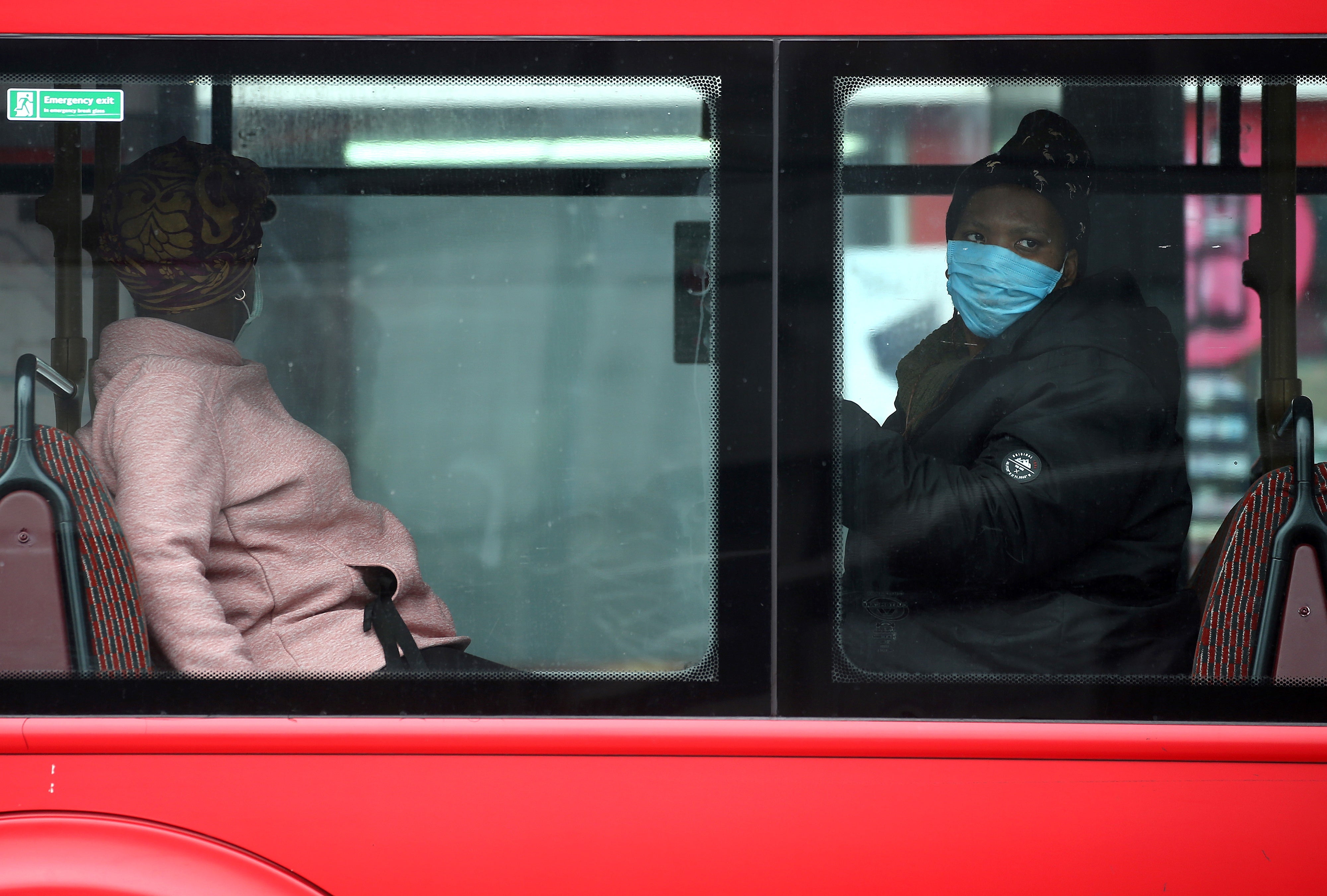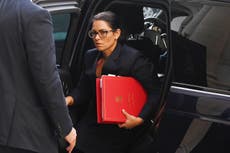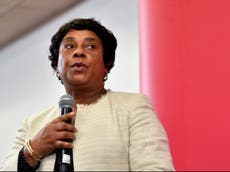Backlash as ministers vow to ditch focus on ‘fashionable’ fight against inequality
Campaigners say fighting poverty is not a question of ‘pitting gender and race on one side against class on the other’ as Liz Truss hits out at ‘identity politics, loud lobby groups and the idea of lived experience’

Your support helps us to tell the story
From reproductive rights to climate change to Big Tech, The Independent is on the ground when the story is developing. Whether it's investigating the financials of Elon Musk's pro-Trump PAC or producing our latest documentary, 'The A Word', which shines a light on the American women fighting for reproductive rights, we know how important it is to parse out the facts from the messaging.
At such a critical moment in US history, we need reporters on the ground. Your donation allows us to keep sending journalists to speak to both sides of the story.
The Independent is trusted by Americans across the entire political spectrum. And unlike many other quality news outlets, we choose not to lock Americans out of our reporting and analysis with paywalls. We believe quality journalism should be available to everyone, paid for by those who can afford it.
Your support makes all the difference.Ministers have been accused of “shirking” their responsibility to tackle racial and gender inequalities after the government announced plans to steer the UK’s equalities policy away from “fashionable” issues on race, sexuality and gender.
Women and equalities minister Liz Truss said there would be a “new approach” to the government’s equality policy in a speech on Thursday, arguing that the debate has been “dominated by a small number of unrepresentative voices”, and by “those who believe people are defined by their protected characteristic".
She claimed the UK had focused too heavily on “fashionable” race, sexuality and gender issues at the expense of poverty and geographical disparities, and hit out at the dominance of “identity politics, loud lobby groups and the idea of lived experience”.
Ms Truss outlined a move away from quotas, targets, unconscious bias training and diversity statements to improve equality, dismissing them as “tools of the left” that “did nothing to fix systems” – and instead set out a fresh “Conservative values” approach based on “freedom, choice, opportunity, individual humanity and dignity”.
Labour’s shadow women and equalities secretary Marsha de Cordova said the remarks amounted to a “gratuitous provocation” from a government that “consistently refuses to face up to its responsibilities and the widening inequality it has caused”.
She added: “When Liz Truss dismisses ‘fashionable’ causes she actually dismisses the devastating impact of discrimination and unfairness in peoples’ day to day lives.
“This year has highlighted how important it is for people to come together. Instead of looking for new ways to divide communities and pining for an era of Thatcherite individualism, the Tories should focus on fixing the structural inequality that holds people back.”
Campaigners accused Ms Truss of failing to listen to communities and “shirking” responsibilities on tackling inequality, arguing that addressing poverty and inequalities in the UK should not mean “pitting gender and race on one side against class on the other”.
Minnie Rahman, public affairs and campaigns officer at the Joint Council for the Welfare of Immigrants, said it was “deeply concerning” that the equalities minister was appearing to “reject” the approach of listening to communities.
Accusing the government of being “well out of step with the public mood”, she said: “At a time when people of colour are dying at disproportionately higher rates from Covid 19, and a year in which millions of people joined a historic anti-racist movement, it is unacceptable for a government minister to try and shirk their responsibilities on tackling equality.
“We know that when government ministers refuse to listen to the communities and individuals affected by their policies, shocking mistakes are made and lives are destroyed, as was the case with the Windrush scandal.”
Dr Halima Begum, chief executive at the Runnymede Trust, said that claims the battle against racism was “fashionable” was an “affront to every single one of those millions of voters” who represent the black and minority ethnic community in the UK.
She added: “This mentality reveals a deeply institutionalised lack of awareness around racism that is entrenched in the Conservative Party. If you want to tackle poverty you need tackle racism."
Nancy Kelley, chief executive of LGBT+ charity Stonewall, said: “It is important to understand that there are many different things that can hold us back. LGBT+ people are part of every community and in every location.
“We can’t separate experiences of homophobia, biphobia, transphobia, sexism, ableism, and racism from socioeconomic status and geographic location. To tackle one, we need to tackle the others.”
Dr Mary-Ann Stephenson, director of the Women's Budget Group, a network of academic researchers and policy experts that analyses government policy from a gender perspective, said addressing poverty and inequalities based on class was not an “either or question pitting gender and race on one side against class on the other”.
“If the government is serious about addressing poverty, they need to recognise women, disabled people and people of colour are more likely to be poor,” she added.
Vivienne Hayes, chief executive of the Women’s Resource Centre, the leading national umbrella organisation for the women’s sector in the UK, said Ms Truss’s comments were “misinformed” and illustrated a “gulf between the government and women’s real-life day-to-day hardship”.
She added: “Women and people of colour consistently bear the brunt of economic crises. They are crises that we haven’t created but we suffer the most. The government must address real, life-threatening, structural inequalities based upon sex and race.”
Frances O’Grady, general secretary of the TUC, said Ms Truss was presenting a “false choice” in her plans to tackle inequality, saying: “No matter who you are or where you are from, everyone should be able to get on in life.
“Ministers must both tackle the barriers facing today’s diverse working class, and act to end the additional discrimination and disadvantage affecting Bame, women and disabled workers."
The backlash comes after the death of George Floyd, an unarmed black man who pleaded for his life as a police officer kneeled on his neck for more than eight minutes, sparked a wave of protests across the world led by the Black Lives Matter movement.
Figures published on Thursday revealed that police use force against black people five times more frequently than against white people in England and Wales, while separate data shows that rates of prosecution and sentencing for black people are three times higher than for white people.
An analysis of racial inequality statistics by the Equality and Human Rights Commission (EHRC) in October found a “worrying picture” in areas including employment, education, crime and living standards.
This mentality reveals a deeply institutionalised lack of awareness around racism that is entrenched in the Conservative Party. If you want to tackle poverty you need tackle racism
The findings showed that unemployment rates are significantly higher for minority ethnic people, at 13 per cent compared with 6 per cent for white people, while black workers with degrees earn 23 per cent less on average than white workers.
With regards to living standards, the EHRC found that 31 per cent of Pakistani or Bangladeshi people live in overcrowded accommodation, while for black people the figure is 29 per cent and for white people it is 8 per cent.
The Government Equalities Office’s latest national LGBT Survey, published in 2018, found that at school, college or university, 19 per cent of LGBT+ people experienced verbal harassment, as well as having much higher rates of mental health disorders, such as depression and anxiety,
The same research also found that hate crime was steadily rising against LGBT+ people across the country, with the number of reported homophobic hate crimes almost trebling over five years, and a 25 per cent increase in the reports of transphobic hate crimes in one year alone.
Campaigners have meanwhile warned progress on tackling the gender pay gap has substantially slowed under the Conservatives. Last year’s gender pay gap was 17.3 per cent, which equates to women being paid an average of roughly 83p for every £1 men made.
In fact, Ms Truss’ own department has the second worst gender pay gap in Whitehall, figures released this week have shown. Women in the Department for International Trade (DIT) earn on average 15.9 per cent less than their male peers – a year-on-year increase of 3.4 per cent.
In her speech on Thursday, Ms Truss said: “Now is the time to root the equality debate in the real concerns people face, delivering quality housing, cutting commute times, improving public transport, ending discrimination in our offices, factories and shop floors and improving our schools so every child has the same chances in life.
“It is our duty to deliver, because if right-thinking people do not lead the fight for fairness, then it will be led by those whose ideas do not work.”
When asked by The Independent how she would respond to claims that she is “pitting” gender and race against class, Ms Truss said: "We are broadening the focus of our equalities work. Of course we need to attack issues of gender and racial disparities, but in addition to that we need to recognise that we have a real issue with geographic inequality.
“The problem is this debate has been framed by which group are you in, which protected characteristic are you part of, rather than saying every individual in this country should have the opportunity of success.
“When you just look at the protected characteristics we’re not looking broadly enough, and we’re not centering it on empowering the individual to help them take ownership of their future."
Home secretary Priti Patel backed Mr Truss’s plans on Thursday morning, telling Times Radio: “We’re focusing on the people’s priorities – we shouldn’t be indulging in fashionable issues of political correctness.”
Subscribe to Independent Premium to bookmark this article
Want to bookmark your favourite articles and stories to read or reference later? Start your Independent Premium subscription today.




Join our commenting forum
Join thought-provoking conversations, follow other Independent readers and see their replies
Comments